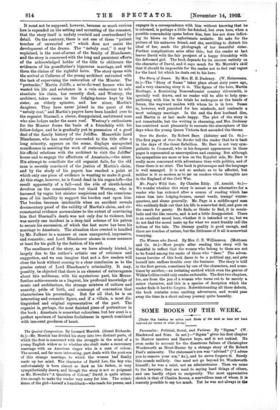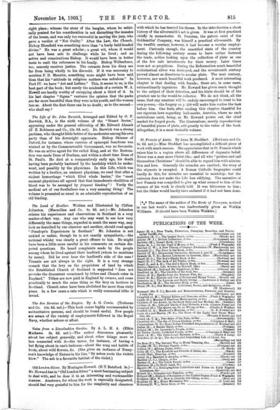SOME BOOKS OF THE WEEK.
[Under this heading we notice such Books of the week as have not been reserved for review in other forins.1 Personalia : Political, Social, and Various. By "Sigma." (W. Blackwood and Sons. 5s. net)—" Sigma" gives his first chapter to Harrow masters and Harrow boys, and is not unkind. He even seeks to account for the disastrous failure of Christopher Wordsworth as Head-Master by a strange story of Sir Robert Peel's animosity. The statesman's son was "advised" ("I advise you to remove your son," &e.), and he never forgave it. Surely this sounds unlikely. One need not go beyond Dr. Wordsworth himself ; he was a saint, not an administrator. Then we come to the lawyers ; they are used to saying hard things of others, and can hardly object to reciprocity. The most appreciative sketch is that of Charles Bowen, a marvellous man of whom it ia scarcely possible to say too much. Yet he was not always in th. right place ; witness the story of the burglar, whom he satiri- cally praised for his consideration in not disturbing the inmates of the house, and was only too successful in moving the jury, who gave a verdict of " Not Guilty." After the Law, the Church. Bishop Blomfield was something more than "a burly bald-headed divine." He was a great scholar ; a great wit, whom it would not have been safe to challenge while he lived ; and an active and conscientious Bishop. It would have been in better taste to omit the references to his family. Bishop Wilberforce, too, scarcely receives justice. The extracts from his diary are far from being wholly to his discredit If it was necessary to mention F. D. Maurice, something more might have been said than that his " attitude in religious matters was nebulous." In Part IV. we have "Art and Letters." This, it seems to us, is the best part of the book; but surely the misdeeds of a certain W. A. Howell are hardly worthy of occupying about a third of it. In his last chapter " Sigma" ventures the opinion that the parks are far more beautiful than they were in his youth, and the women less so. About the first there can be no doubt; as to the second— who shall say ?















































 Previous page
Previous page